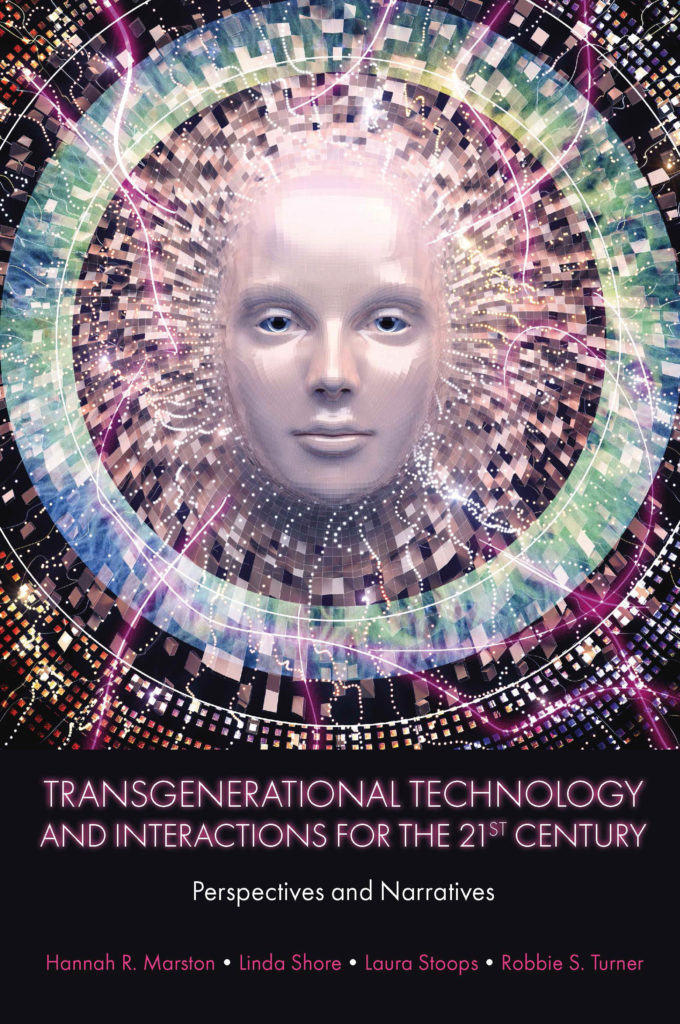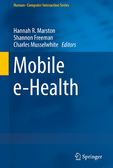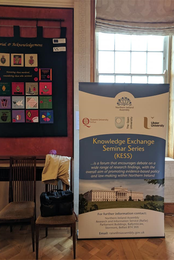Latest News
Published Books:
Available to order now – Society and technology: Promoting well-being in a digital age.
Marston, H. R. (Ed.). (2025 ). Society and technology: Promoting well-being in a digital age. Cognella.
). Society and technology: Promoting well-being in a digital age. Cognella.
This edited book will be published in late June and consists of 12 chapters, including contributions from scholars in the disciplines of sociology, nursing, user centred design, age-friendly cities & communities, engineering, gerontology, social work, computer science, palliative care, loneliness/social isolation, social policy and practice.
Transgenerational Technology and Interactions for the 21st Century: Perspectives and Narratives

Order Here
Listen to the PODCAST
Overview: Transgenerational Technology and Interactions for the 21st Century explores how we as humans navigate the 21st Century, interacting with technologies, including those that are intended to support and enhance our experiences across the lifespan. This manifesto, composed with humanity at the front and centre, pinpoints succinctly the critical considerations of people, technology and inequalities intersecting across our 21st century ecosystems.
With a special focus on bridging interdisciplinary research, creative and co-production approaches, the authors explore and present cutting edge discourse, building on previous research to form contemporary and inform future awareness and strategies to societal experiences. The authors argue that it is time to re-evaluate how we move forward in a multi-faceted society, with the ever growing reliance of technology but yet many voices are not heard, left behind or not even considered.
This creative and collaborative response is suited to researchers, academics, designers, industry and stakeholder professionals who have an interest the fields of technology, design, sociology and innovation.
Citation:
Marston, H.R., Shore, L., Stoops, L., & Turner, R. (2022). Transgenerational Technology and Interactions for the 21st Century: Perspectives and Narratives. Emerald. ISBN 9781839826399
Endorsement:
“From technology usage during the pandemic to digital poverty and the digital divide, this book focuses on the past, present and future of technology – using a unique transgenerational framework to consider the unique experiences, interactions and expectations of the Silent Generation, Baby Boomers, Generation X, and the Millennials. Technology can enrich the lives of older people, and this reflection on how digital engagement might facilitate ageing-in-place, and age-friendly cities and communities, is particularly salient in our post-pandemic world. The book is a timely reminder that we must prioritise digital inclusion across all generations and sectors, ensuring that all citizens have digital skills, knowledge, and confidence – this is the essence of the book’s closing manifesto, which is an urgent call for thoughtful engagement with technology research, practice, and policy.” Professor Evonne Miller – Queensland University of Technology, Australia
#COVID-19 Studies, & Writings
#COVID19 is a worldwide pandemic and crises for all governments and citizens. Technology will and is playing an important role within our respective communities to maintain work, communication, sharing information and more importantly reduce isolation and loneliness for all!
- Marston, H.R., Prabhu, V., & Earle, S. (2025). Understanding eHealth, loneliness and well-being experiences during the COVID-19 pandemic: A UK insight. Cogent Gerontology, 4(1). https://doi.org/10.1080/28324897.2025.2501490
- Großschädl, F., Marston, H. R., Ivan, L., Prabhu, V., & Earle, S. (2025). Age as an important predictor for digital health literacy: Cross-sectional evidence of internet users from an international multisite study in North America and EU countries. Educational Gerontology, 1–14. https://doi.org/10.1080/03601277.2025.2505568
- Ivan, L., Marston, H.R., Girishan Prabhu, V., Großschädl, F., Alexandra Silva, P., Buttigieg, S.C., Öztürk Çalıkoğlu, H., Bilir Koca, B., Arslan, H., Kanozia, R., Browning., M.H.E.M., Freeman, S., Earle, S. (2025). Successful Aging across Middle vs High-Income Countries: An Analysis of the Role of eHealth Literacy Associated with Loneliness and Wellbeing, The Gerontologist, 65, gnae170. https://doi.org/10.1093/geront/gnae170.
- Marston, H. R., Girishan Prabhu, V., & Ivan, L. (2025). Understanding Technology Use During the COVID-19 Pandemic Through the Lens of Age-Friendly Cities and Communities: An International, Multi-Centre Study. COVID, 5(1), 7. https://doi.org/10.3390/covid5010007
- Marston, H.R., Morgan, D.J., Earle, S., & Hadley, R.A. (2023). Shiver Me Tinders and Ring a Ding for a Fling—Sex Tech Use during COVID-19: Findings from a UK Study. Healthcare; 11(6), 897; https://doi.org/10.3390/healthcare11060897.
- Chidiac, M., Ross, C., Marston, H.R., & Freeman, S. (2022). Age and Gender Perspectives on Social Media and Technology Practices During the COVID-19 Pandemic. IJERP; 19(21), 13969; https://doi.org/10.3390/ijerph192113969
- Freeman, S., Marston, H.R., Ross, C., Morgan, D.J., Wilson, G., Gates, J., Kolochuk, S., & McAloney, R. (2022). Progress towards enhanced access and use of technology during the COVID-19 pandemic: A need to be mindful of the continued digital divide for many rural and northern communities. Healthcare Management Forum. doi:10.1177/08404704221108314
- Marston, H.R., Morgan, D.J., Wilson, G., & Gates, J. (2021). You Can Only Pass Go With A Digital Pass. Ageing Issues Blog, 14th June 2021.
- Marston, H.R., & Morgan, D.J. (2021). Freedom is coming Dating Apps, Social Connections, Cheeky Snogs & Nooky. Ageing Issues Blog, 14th June 2021.
- Marston, H.R., & van Hoof, J. (2021). Age-friendly cities and communities of the 21st Century. Ageing Issues Blog, 9th February 2021.
- Marston, H.R., & Morgan, D.J. (2021). Happy New Year, 3rd Wave, Lockdown 3.0 & Easter. Ageing Issues Blog, 22nd January 2021
- Marston, H.R., & Morgan, D.J. (2020). Lockdown 2.0: Gunpowder Plot, Digital Christmas, Sex and Relationships. Ageing Issues Blog, 2nd November 2020.
- Marston, H.R., & Morgan, D.J. (2020). Technology & Social Media during COVID-19 Pandemic. Special Issue: COVID-19 & Geriatric Mental Health Worldwide. IPA Bulletin; 37(2). Available from https://www.ipa-online.org/publications/ipa-bulletin/featured-articles/covid-19-bulletin-articles/technology-social-media-during-covid19
- Marston, H.R., & Kowert, R. (2020). What role can videogames play in the COVID-19 pandemic? Emerald Open Res. 2:34. https://doi.org/10.35241/emeraldopenres.13727.1
- Sheerman, L., Marston, H.R., Musselwhite, C., & Morgan, D. (2020). COVID-19 and the secret virtual assistants: the social weapons for a state of emergency [version 1; peer review: awaiting peer review]. Emerald Open Res, 2:19. https://doi.org/10.35241/emeraldopenres.13571.1
- White, P.J., Marston, H.R., Shore, L., & Turner, R. (2020). Learning from COVID-19: Design, Age-friendly Technology, Hacking and Mental Models [version 1; peer review: awaiting peer review]. Emerald Open Res, 2:21. https://doi.org/10.35241/emeraldopenres.13599.1
- Marston, H.R., Musselwhite, C., & Hadley, R.A. (2020). COVID-19 vs Social Isolation: the Impact Technology can have on Communities, Social Connections and Citizens. Ageing Issues, 18th March, 2020. The British Society of Gerontology.
#COVID-19 Study 1
COVID-19: TECHNOLOGY, SOCIAL CONNECTIONS, LONELINESS & LEISURE ACTIVITIES
This study led by Dr Hannah R. Marston and Dr Sarah Earle, and will use an online survey, deployed across mailing lists, and social media platforms to reach as many people as possible. The online survey comprising of 65 questions relating to technology use, community engagement, health and wellbeing, loneliness and leisure activities.
Since April 2020, this study has been scaled up and the online survey has been deployed across Spain, France, Romania, Germany, Austria, Turkey, Malta, Singapore, India, Portugal, and Brazil. For more information click here.
- Ethics: HREC/3551/MARSTON
Funding: this project is not externally funded.
Publications:
- Marston, H.R., Prabhu, V., & Earle, S. (2025). Understanding eHealth, loneliness and well-being experiences during the COVID-19 pandemic: A UK insight. Cogent Gerontology, 4(1). https://doi.org/10.1080/28324897.2025.2501490
- Großschädl, F., Marston, H. R., Ivan, L., Prabhu, V., & Earle, S. (2025). Age as an important predictor for digital health literacy: Cross-sectional evidence of internet users from an international multisite study in North America and EU countries. Educational Gerontology, 1–14. https://doi.org/10.1080/03601277.2025.2505568
- Ivan, L., Marston, H.R., Girishan Prabhu, V., Großschädl, F., Alexandra Silva, P., Buttigieg, S.C., Öztürk Çalıkoğlu, H., Bilir Koca, B., Arslan, H., Kanozia, R., Browning., M.H.E.M., Freeman, S., Earle, S. (2025). Successful Aging across Middle vs High-Income Countries: An Analysis of the Role of eHealth Literacy Associated with Loneliness and Wellbeing, The Gerontologist, 65, gnae170. https://doi.org/10.1093/geront/gnae170.
- Marston, H. R., Girishan Prabhu, V., & Ivan, L. (2025). Understanding Technology Use During the COVID-19 Pandemic Through the Lens of Age-Friendly Cities and Communities: An International, Multi-Centre Study. COVID, 5(1), 7. https://doi.org/10.3390/covid5010007
- Marston, H.R., Ko, P-C., Prabhu, V.G., Freeman, S., Ross, C., Sharaievska, I., Browning, MHEM., Earle, S., Ivan, L., Kanozia, R., Çalıkoğlu, H.Ö., Arslan, H., Bilir-Koca, B., Silva, P.A., Buttigieg, S.C., Großschädl, F., & Schüttengruber, G. (2023). Digital Practices by Citizens During the COVID-19 Pandemic: Findings From an International Multisite Study. JMIR Ment Health 2023;10:e41304. doi: 10.2196/41304
- Chidiac, M., Ross, C., Marston, H.R., & Freeman, S. (2022). Age and Gender Perspectives on Social Media and Technology Practices During the COVID-19 Pandemic. IJERP; 19(21), 13969; https://doi.org/10.3390/ijerph192113969
- Marston, H.R., Ivan, L., Fernández-Ardèvol, M., Rosales Climent, A., Gómez-León, M., Blanche, D., Earle, S., Ko, P.C., Colas, S., Bilir, B., Öztürk Çalıkoğl., Arslan, H., Kanozia, R., Kriebernegg, U., Großschädl, F., Reer, F., Quandt, T., Buttigieg, S.C., Alexandra Silva, P., Gallistl, V., & Rohner, R. (2020). COVID-19: Technology, Social Connections, Loneliness & Leisure Activities: An International Study Protocol. Front. Sociol. doi:10.3389/fsoc.2020.574811
- Marston, H.R., et al., (2020) – Research Evidence#1 LBCO224 – Life beyond COVID. Submitted 30th August, published 18th September 2020, COVID-19 Committee. Written evidence (page 11). All evidence is available here.
#COVID-19 Study 2
#COVID-19: Dating Apps, Social Connections, Loneliness & Mental Health
This study is led by Dr Hannah R. Marston, with Co-I’s Dr Sarah Earle (OU), Dr D.J. Morgan, (Swansea University), and Dr Robin Hadley.
The purpose of this study is to explore and understand how dating apps have been used by citizens during the pandemic to connect with others on a social, emotional and sexual level, to reduce the feeling of loneliness and social isolation.
- Marston, H.R., Earle, S., Morgan, D.J., & Hadley, R.A. (2025). Ethical Concerns and Risks Surrounding Dating Apps: Findings from a UK Covid-19 Study. Chapter 2 In: H.R. Marston (Ed.). Society and Technology: Promoting Well-Being in a Digital Age? Cognella, San Diego, USA. ISBN: 979-8-8233-6039-5
- Marston, H.R., Morgan, D.J., Earle, S., & Hadley, R.A. (2023). Shiver Me Tinders and Ring a Ding for a Fling—Sex Tech Use during COVID-19: Findings from a UK Study. Healthcare; 11(6), 897; https://doi.org/10.3390/healthcare11060897.
- Marston, H.R., Morgan, D.J., Earle, S., Hadley, R. (2021). Presentation at the British Society of Gerontology.
Project website here



 ).
). 



